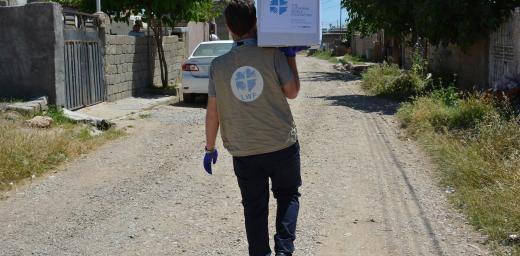Empowering most vulnerable Rohingya refugees
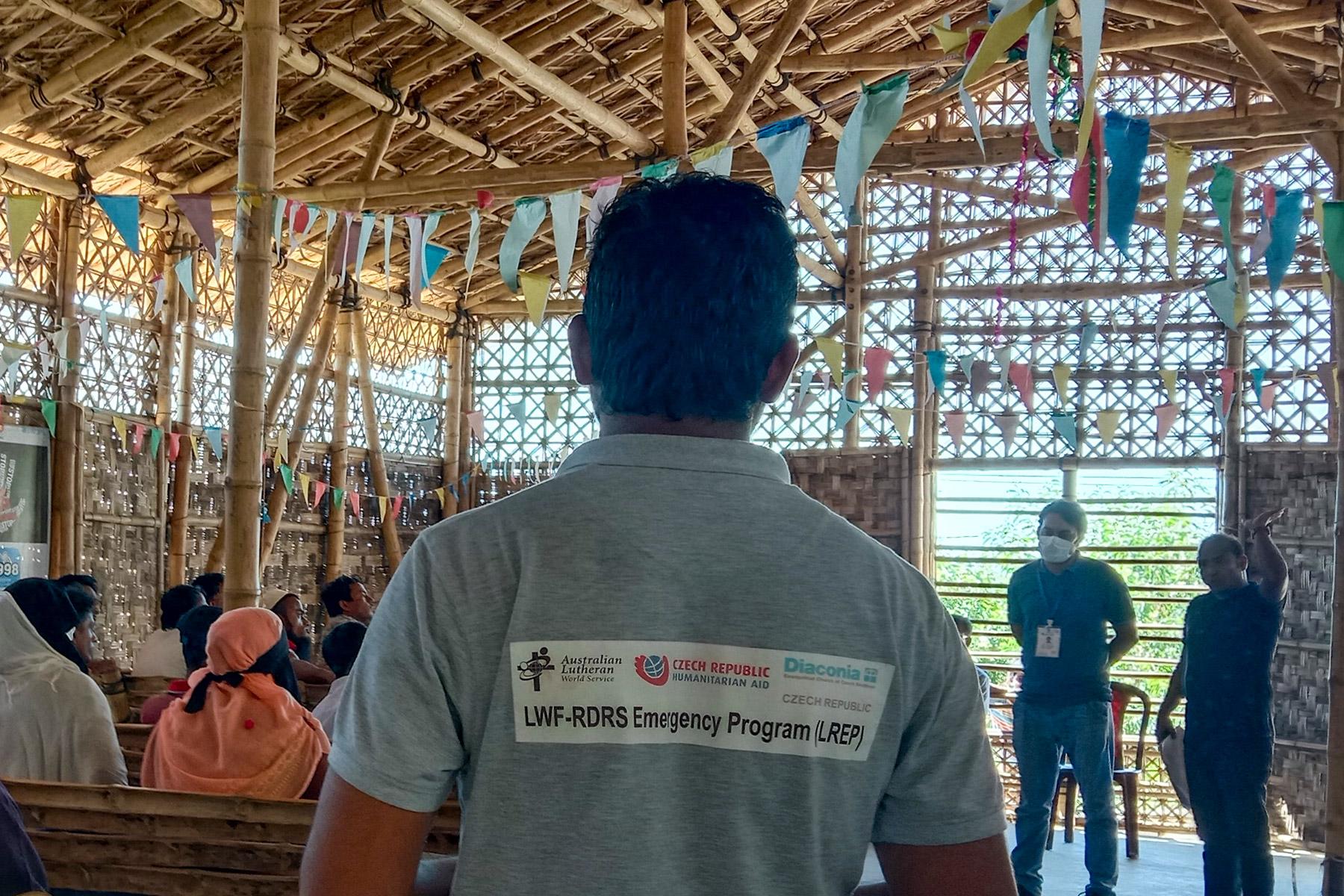
Before starting any new activities for Rohingya refugees, RDRS Bangladesh staff carry out a comprehensive needs assessment with the local community to make sure that vulnerable people can access the support and services they need. All photos: RDRS Bangladesh/B. Wadud
World Humanitarian Day series shines spotlight on Gender and Inclusion Officer in Cox’s Bazaar camps
(LWI) - On World Humanitarian Day, 19 August, Ms Bela Wadud will be busier than ever coordinating support to the most vulnerable members of Bangladesh’s Rohingya refugee population facing worsening living conditions in the camps of Cox’s Bazaar. Wadud works as a Gender and Inclusion Officer for RDRS Bangladesh, a former Lutheran World Federation (LWF) country program localized in 1997. As part of its commitment to localization, LWF supports RDRS Bangladesh in its response to the Rohingya crisis in Cox’s Bazaar.
In August 2017, an estimated 750,000 Rohingyas fled across the border from Myanmar into Bangladesh, joining thousands of other displaced people to form one of the largest refugee settlements in the world. Since then, RDRS has been providing emergency relief, as well as longer-term recovery programs for both refugees and local host communities.
Wadud’s job is to ensure that women and girls, as well as people with disabilities, are included in all support and income-generating activities. With a background in economics, she previously worked in the development sector in the capital, Dhaka, where she saw how women, the elderly, and those with disabilities often struggled to meet their most basic needs. Growing up with a family member who had physical and intellectual impairments helped inspire her work, as she learned the importance of treating the most vulnerable with dignity and compassion.
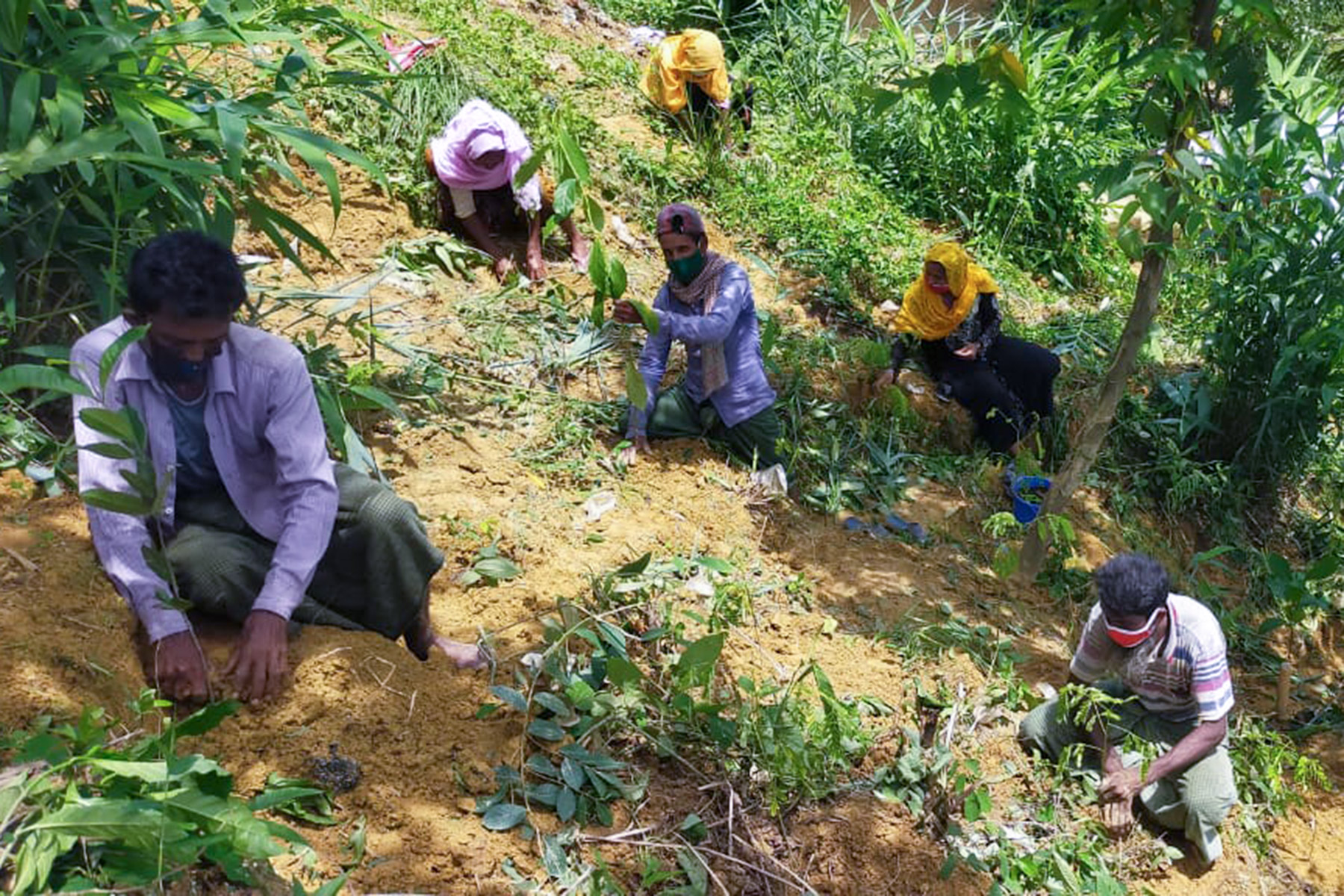
Rohingya women and men, including those with disabilities, are engaged in cash-for-work activities to plant and nurture tree saplings on deforested areas of the camps in Cox’s Bazaar.
While the plight of the Rohingya people has faded from the world’s media, the situation has worsened for many of the refugees over the past year. A devastating fire in the camps in March killed 15 people. It destroyed tens of thousands of homes, while recent severe floods and landslides have claimed at least a dozen lives and left a further five thousand homeless. At the end of July, the UN Refugee Agency reported that the camps were deluged with 300mm of rain, nearly half the average monthly rainfall, in just one day.
Income-generating activities
“The flooding causes blocked drains and the risk of diseases,” says Wadud, “so we continually do drainage cleaning and repair, as well as providing personal hygiene training to protect people from both water-borne diseases and COVID-19.” When homes are washed away, “people need to be relocated in the shelters and supported with food until they can start their income-generating activities and be empowered to rebuild their lives,” she adds. Women, the elderly, and those with disabilities are especially vulnerable, Wadud continues. So, her task is to make sure they can access services such as water, sanitation, and hygiene (WASH) and participate in all livelihood activities.
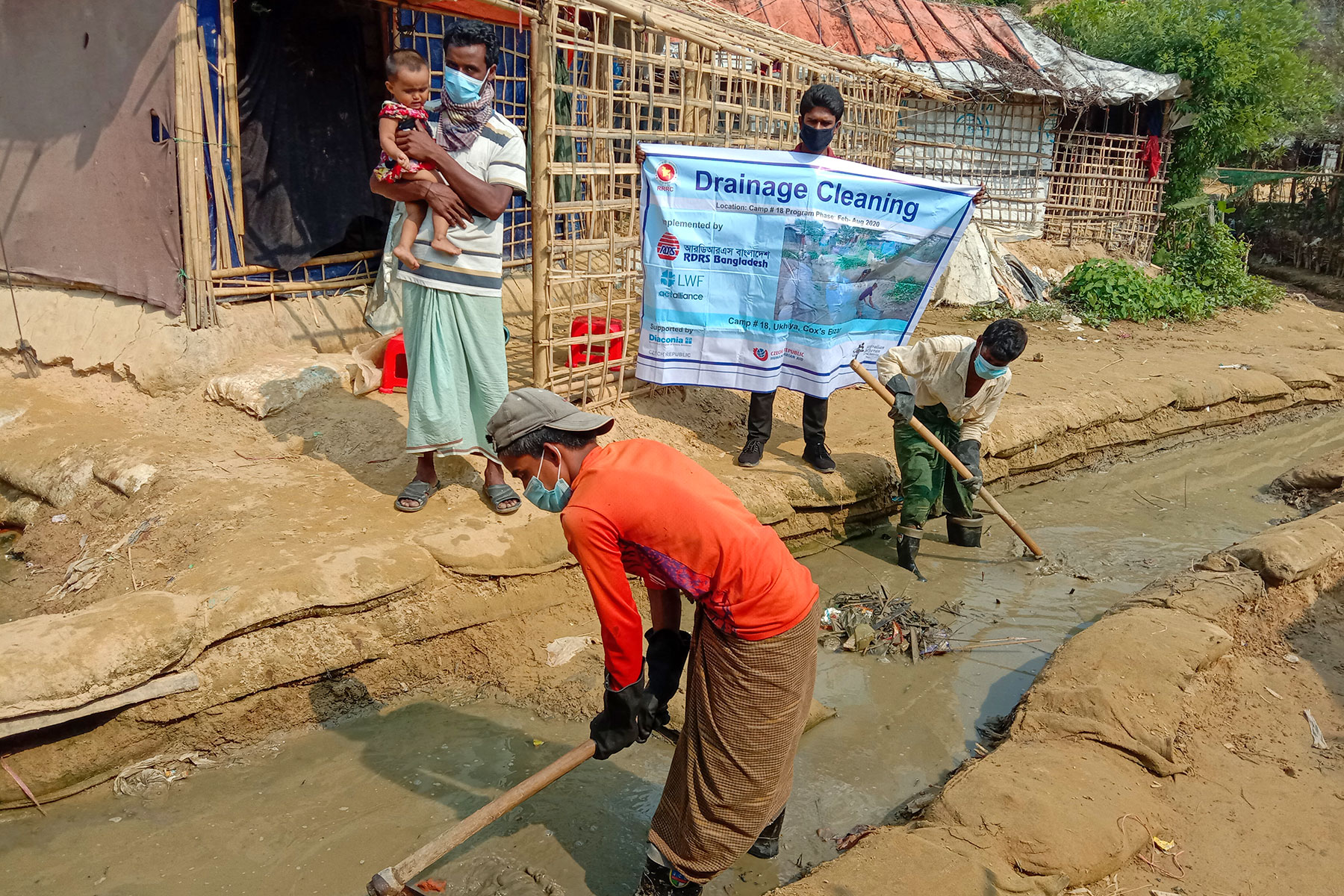
A cash-for-work approach is also used for drainage clearing and maintenance in the refugee camps.
One of the main activities supported by RDRS is planting trees on the barren hillsides, which are most prone to deadly landslides during the monsoon season from June to September. Refugees and members of the local host population, including a volunteer group called Green Voice, are employed on a daily ‘cash-for-work’ basis to plant and nurture the young saplings. These include fast-growing varieties and plants that can be used for medicinal purposes.
Another important activity is poultry breeding, which is particularly suited to conditions in the camps where families have little space to grow food or keep other animals. Chickens and fresh eggs provide an important source of protein for a family’s diet. The eggs can also be sold at the local markets to provide income, especially to women-headed households and people with disabilities. Fresh vegetables are also provided for vulnerable households, while pregnant and nursing mothers receive supplementary food and nutritional advice for themselves and their families.
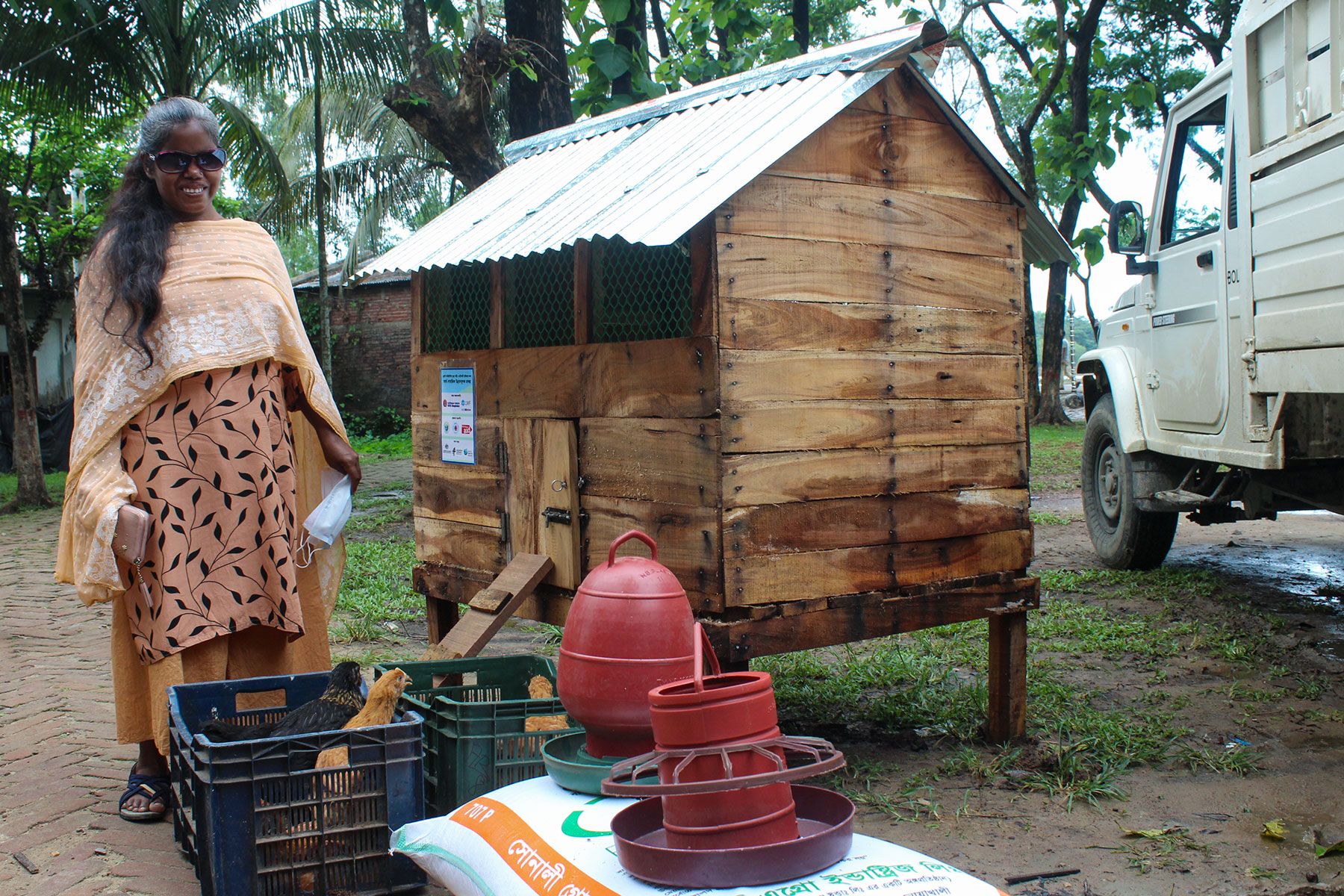
To begin poultry breeding as an income-generating activity, a visually impaired beneficiary receives chickens with a coop and food.
Dignity kits for women and girls
Wadud also oversees the provision of menstrual hygiene and reproductive health items known as ‘dignity kits’ for women and girls in the camps. By sharing her own experiences, she encourages other women to feel at ease asking questions and discussing their concerns. While severe lockdown restrictions have meant that she could no longer enter the camps herself, she has continued her work through a network of Rohingya volunteers who monitor the implementation of these Gender and Inclusion activities. Since the start of the pandemic, RDRS has also been supplying books and other learning material to children in host communities whose education has been disrupted.
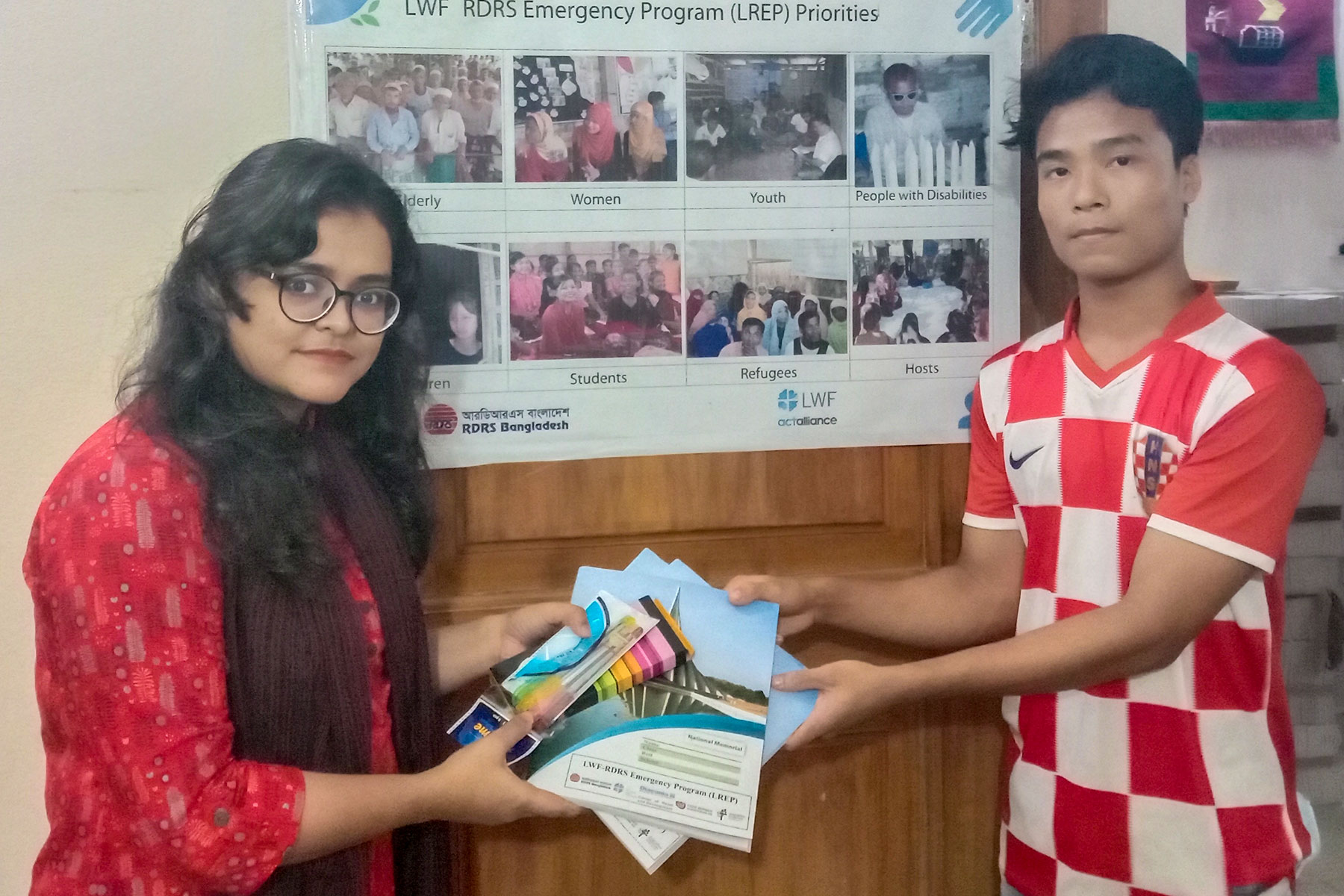
Ms. Bela Wadud distributes learning materials to children in host communities whose education has been disrupted.
While the refugee population has experienced far fewer COVID-19 deaths than feared initially, a strict lockdown has made it harder for people to find work, buy food, and access vital services. Mr Bhoj Khanal, coordinator for the LWF’s Asia and the Pacific Regional Emergency Hub, notes that vaccines have not yet begun to be rolled out among the refugee population. Only 3 percent of Bangladesh’s 165 million people have been vaccinated.
Khanal says COVID-19 has also caused a drop in funding for some projects, while programs have had to be adapted to train more volunteers to carry out activities in the camps. RDRS’s work is currently funded by the Evangelical Lutheran Church in America, the Evangelical Church of the Czech Brethren and Australian Lutheran World Service, as well as by UN Women, the Czech Ministry of Foreign Affairs and Australia’s Department of Foreign Affairs and Trade.
LWF/P. Hitchen
Throughout August, Lutheran World Information will feature interviews with humanitarian workers contributing to LWF’s emergency and development work worldwide.
World Humanitarian Day is observed each year on 19 August to honor humanitarian aid workers, including United Nations and other personnel, who are committed to the service of the world’s most vulnerable people and communities. It marks the day on which the former UN Special Representative of the Secretary General to Iraq, Sérgio Vieira de Mello, and 21 of his colleagues were killed in the bombing of the UN headquarters in Baghdad in 2003.


